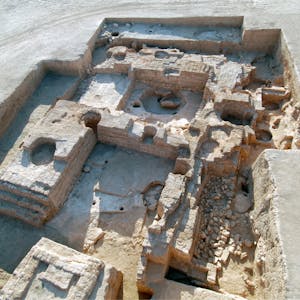Recovering the Humankind’s Past and Saving the Universal Heritage
Archaeology is, among human sciences, the discipline with the strongest importance for the rediscovery, but also for the preservation and protection of cultural heritage, as Humankind’s universal patrimony. You will be introduced to the way we ourselves reflect on and are engaged with the study of human past: from the practical and material recovery of ancient traces in the field to the study and interpretation. On the other hand, the discovery of human past implies the correct conservation and presentation for both experts and general public: the study and protection of the past we share every day prevent from any possible destruction, misuse, abuse and thus cancellation of human memory.“Recovering the Humankind’s Past and Saving the Universal Heritage” presents to a large public Archaeology as a historical discipline: through an inter-disciplinary perspective you will follow the evolution and change of archaeology to the moment when natural sciences contributed to make the historical reconstructions scientifically sound; the aid of informatics and of virtual reconstructions gives new fascination to the already strong suggestion of Archaeology, as the discipline of discovery par excellence. Within this frame, Ebla, which is the glory of the Sapienza school of Oriental archaeology, will have an exemplary meaning in the course development as a long lasting experience on the field and an excellent example of the scientific results of combined researches and disciplines.
Moreover, the course will focus on actual, innovative instruments to preserve, monitor and give value to cultural heritage through a multidisciplinary approach, based on a deep archaeological and historical knowledge but also on ICT technologies. The wide adoption of ICT technologies in our daily life is also impacting in the way in which we interact with our cultural heritage in particular in terms of preservation and dissemination of cultural objects.
In this course you will learn the basic techniques to digitize cultural objects and obtain 3D digital copies of a physical objects such as statues, vases or archaeological sites. We will also discuss how to structure the raw data in order to facilitate and make effective the access to digital contents. In particular, we will present the European Data Model, a framework for collecting, connecting and enriching data on cultural objects provided by a number of museum, archives, sites and libraries in Europe.
None
Syllabus
Syllabus - What you will learn from this course
Week 1
COURSE INFORMATION & COLLABORATIVE ACTIVITIES
Week 1 - The recovery of the human past and the protection of the universal heritage.
Week 2
Week 2 - The birth of archaeology and its role in the contemporary world.
Week 3
Week 3 - The birth of archaeology and its role in the contemporary world.
Week 4
Week 4 - The birth of archaeology and its role in the contemporary world.
Week 5
Week 5 - The birth of archaeology and its role in the contemporary world.
Week 6
Week 6 - Digitizing Cultural Objects and 3D virtual reconstruction
Week 7
Week 7 - Digitizing Cultural Objects and 3D virtual reconstruction
Week 8
Week 8 - Digitizing Cultural Objects and 3D virtual reconstruction
FAQ
When will I have access to the lectures and assignments?
Access to lectures and assignments depends on your type of enrollment. If you take a course in audit mode, you will be able to see most course materials for free. To access graded assignments and to earn a Certificate, you will need to purchase the Certificate experience, during or after your audit. If you don't see the audit option:
What will I get if I purchase the Certificate?
When you purchase a Certificate you get access to all course materials, including graded assignments. Upon completing the course, your electronic Certificate will be added to your Accomplishments page - from there, you can print your Certificate or add it to your LinkedIn profile. If you only want to read and view the course content, you can audit the course for free.
Is financial aid available?
Yes. In select learning programs, you can apply for financial aid or a scholarship if you can’t afford the enrollment fee. If fin aid or scholarship is available for your learning program selection, you’ll find a link to apply on the description page.
Reviews
I like this course a lot. It provides basic knowledge for understanding archaeology and the attitude towards history. Though some parts could be improved, I advice focusing on the content.
Very interesting course. The virtual reconstruction work was new.
Attending this course really helped me a lot. I would like to thank everyone who contributed to the preparation and presentation of the course.
It is beneficiary for both excavation and preserving the heritage related artifects.
